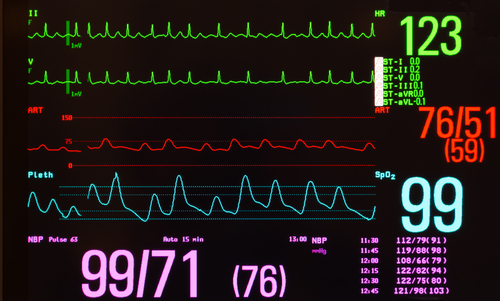Understanding your heart rate variability or HRV score, along with knowing how to maximize its range, is critical for improving resilience and adaptability within and across an individual's lifetime. Although these two terms may seem general, they sumamrize the potential benefit of HRV training! Research currently establishes HRV as a gateway to nervous system balance and/or re-balance. This has a great deal to do with strengthening specific nervous system responses required for managing both acute and chronic impacts from stress, anxiety, focus and depression to name a few.
Heart-rate variability training involves systematically working to increase the range at which your heart rate continuously speeds up and slows down (ie. variability). That is, our heart rate is continuously slowing down and speeding up so it is never constant. Follow this link to view a 20 min discussion by Dr. Inna Khazan, Ph.D, BCB . HRV: Your Own Personal Superpower & How to Harness It.

Heart beats/minute as a common measure although informative, does not reflect an individual's HRV. As our hearts continually speed up and slow down they create peaks and valley's representing the fastest and slowest point for each unique heartbeat. The averages for both high and low points create a range. Research supports that the higher the range (ie. HRV score of 15), the more resilient ones overall physiological responding is across dynamic situations. The red line to the right reflects the up and down continual motion (sinusoidal wave form) of the heart.
How does it work?
Heart rate variability (HRV) training uses a finger or ear sensor that detect ongoing variations in one's heart rate that is then displayed or "fed-back" on a computer monitor in real-time. By slowing one's breathing pattern heart rhythm and breathing rhythm become synchronized. This equates to purposefully exercising one's heart resulting in a healthier emotional and physiological state. This synchronization is referred to as Respiratory Sinus Arrhythmia or RSA. Overtime, improved/high-HRV positively correlates with the ability to respond more effectively to stressful situations and adapt to them more efficiently. This supported mind-body relationship improves overall self-management and response. This shift in heart rhythms creates a favorable cascade of neuronal, hormonal, and biochemical events that benefit the entire body. Blood pressure drops. Stress hormones plummet. The immune system pumps up. Anti-aging hormones increase. You gain clarity, calmness, and control.
HRV for training peak/optimal performance
HRV training is well established as a tool for improving an individual peak athletic performance as well as optimizing performance at work. Remember...., adaptability and resilience are factored in to every response we make across situations. See on our website Peak & Optimal Performance Training